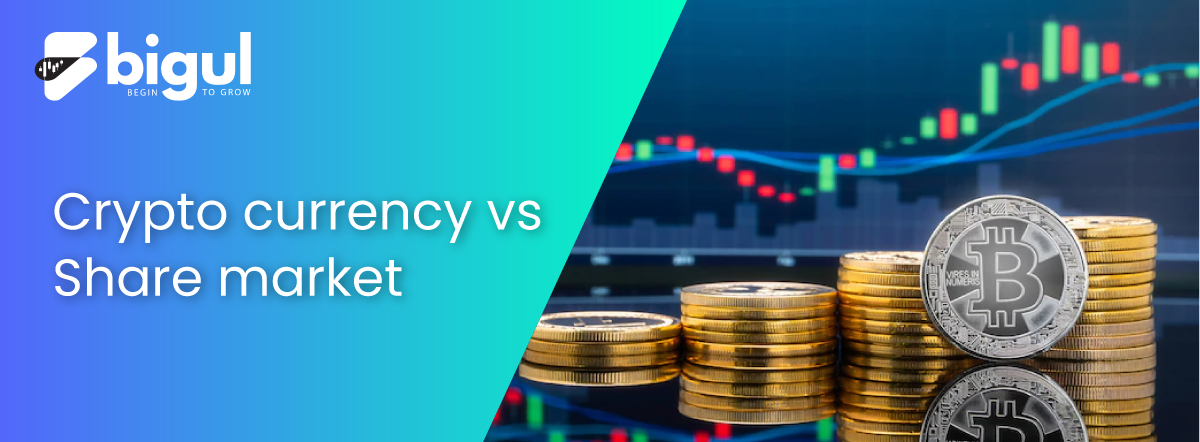
Cryptocurrency versus Share Market
- Ownership
Usually, a brokerage account is often required to complete the transaction when buying and owning stock. Your address, social security number, signature, and other details are used to verify that account. This provides some security in the event of fraudulence or theft of identity.
Cryptocurrency provides more privacy having less security. Your other digital resources or coins are kept in a crypto wallet, which might be entirely virtual or occur on a USB drive. Privacy comes with unusual risks, there is a possibility of losing crypto to cyberpunks or entry to your account, or you might forget your password. Also, there are chances of losing all your crypto and track of the USB drive.
- Exchanges
Stock markets have operated in one structure or another, notably on Wall Street in New York City over three centuries. On the contrary, cryptocurrency exchange Binance debuted in 2017. Another notable participant, Coinbase, was established in 2012.
Binance’s daily trade volume was around $76 billion as of August 2022. Simultaneously, the Nasdaq, a modest portion of the world stock market, had a trading volume almost threefold that amount. Furthermore, some estimates show the Nasdaq at only 14.5% of the entire stock market.
- Liquidity
Smaller markets have an impact on your ability to buy and sell investments, whether they can be stocks or cryptocurrencies. Liquidity refers to the capacity to trade at will. Due to the abundance of active traders on the stock market, investors often view stocks as being very liquid.
However, liquidity differs significantly from one type of coin to another when it comes to cryptocurrency. Due to its larger trading volume, bitcoin is more liquid than the majority of cryptocurrencies. If you wish to purchase or sell a particular cryptocurrency, more buyers and sellers are willing to engage in trading.
Investors in stocks and cryptocurrencies are susceptible to slippage, resulting in losses when you have to sell a significant portion of an asset during a time of low liquidity. Due to the lower market liquidity, cryptocurrency owners may face maximum risk.
- Volatility
Purchasing both stocks or crypto carries risk and volatility. It’s difficult to assess the market to determine the optimal time to buy or sell since the value of both assets can rise or fall.
Although the stock market has a well-deserved reputation for being volatile, the overall market has generally risen over decades, with a total return of around 10%. Investors have access to various sources of information to help them decide whether to purchase certain securities because previous performance is not a guarantee of future results, and public companies must disclose their financial information to the public.
However, compared to other assets, cryptocurrencies are more prone to experiencing abruptness leaving some people to ask why cryptos can be so volatile. It shows significant swings in value that too without prior notice. For crypto traders, these fluctuations can result in potentially enormous profits but can also quickly result in substantial losses. In recent years, almost 1,600 types of crypto have wholly disappeared. Public corporations may go bankrupt but have a much lower chance of losing their value than most cryptocurrencies.
Investors in stocks and cryptocurrencies are susceptible to slippage, resulting in losses when you have to sell a significant portion of an asset during a time of low liquidity. Due to the lower market liquidity, cryptocurrency owners may face maximum risk.
- Trading Costs
Investors may be required to pay transaction costs called commissions which reduce their returns each time they buy or sell stocks. Even investors who buy index mutual funds with minimal fees and no loads, which are essentially collections of stocks, must pay fees to maintain the fund.
Investing through a brokerage account and actively managed funds may have greater charges.
There isn’t a distinction between cryptocurrencies and equities as cryptos can also come with significant costs. Cryptocurrency exchanges levy fees along with “gas fees,” which are the charges extracted by a network from different blockchain transactions. The costs for each type of cryptocurrency differ significantly.
Some networks will increase gas costs to speed up transactions. But according to some estimates, the top exchanges impose at least 1.5% fees to purchase or sell cryptocurrency. The gain below 3% will be eliminated by this.
- Regulation
National agencies such as the Securities and Exchange Board of India (SEBI) regulate the equity market. Regulation bodies ensure a certain amount of transparency in publicly listed companies.
However, cryptocurrencies do not have any regulatory body.
That is an advantage for investors with conflicting opinions on government regulation. Each cryptocurrency is operated through decentralized networks, with individuals concentrating on the upkeep of the technology and protecting the project’s integrity.
Cryptocurrencies and exchanges are still at risk of radical change or eradication since regulating cryptocurrencies is a contentious issue. For instance, a hot topic of discussion in 2022 has been whether cryptocurrency is considered a security or a commodity.
- Trading Hours
The stock markets are typically accessible during regular business hours, Monday to Friday, and closed on weekends and national holidays.
However, the crypto market is open every day of the year around the clock. One reason cryptocurrency is so volatile may be the markets’ constant accessibility. Decades of stock market studies have demonstrated that investors frequently give in to emotional impulses that can influence their investment behavior. A break might help you regain order and control.
- Diversification
A diverse portfolio of holdings that perform differently in various markets is what many investors strive to achieve. Equities frequently follow the larger economy’s performance and are influenced by various variables, including inflation, unemployment, interest rates, and more.
Some supporters of cryptocurrencies believe that they are non-correlated assets, which means they don’t react to market movements the same way conventional securities like stocks and bonds do. In addition, it might serve as a hedge against inflation, making it a desirable counterweight in a portfolio of more inflation-sensitive assets.








.jpg)
.jpg)